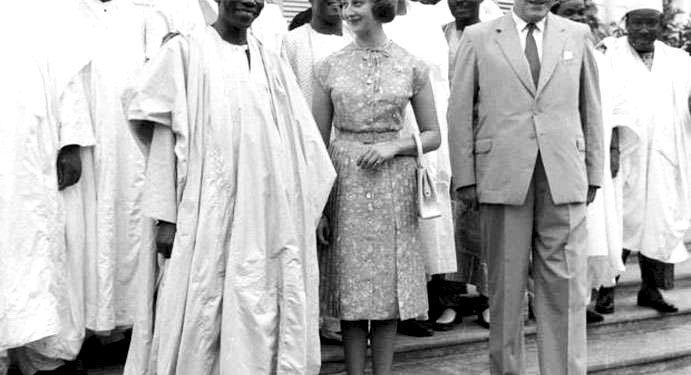Sixty years after, Nigeria are counting the gains and costs of indigenous leadership.
Independence had lifted the yoke of imperialism and make Nigerians to take their destiny in their hands.
The country has made progress across the sectors. But, a lot of mistakes have also been made by its successive leaders, which retarded its progress.
The first six years of independence were even turbulent. Although under that climate of federalism, each of the three, and later four regions, were developing at their own pace, the competition for federal power by key actors from the component units created friction, rivalry, rancour and antagonism.
Yet, it was during the first six years that Nigerian universities, even at their infancy, were the toasts of the West African all-region.
There was productivity. Oil was not in vogue. The cocoa of the West, coal of the East and the groundnut pyramid of the North attracted revenue for development.
The ruling parties of independence era, despite their mutual suspicions, were doing well in their domains where they midwifed regional governments. They were ideological platforms bubbling with their differential visions about development, aptly dictated by regional references and available resources.
Early leaders were expert in planning. But, unable to manage their achievements, the hot contest for power at the centre made them to indulge in tactics that bothered on exclusion, oppression and divide and rule.
Up came the military, which later foisted the unitary system. Although the military never made any pretext to run an accountable government, seasoned civil servants assisted the military regimes in the seventies to come up with Development Plans.
The plans collapsed when Gen. Yakubu Gowon was toppled in 1975.
In 1978, Operation Feed the Nation (OFN) was launched by former military Head of State, Gen. Olusegun Obasanjo. It motivated the country to strive at self-sufficiency in food production.
Under President Shehu Shagari, Green Revolution came on board. Later, the regime started granting licence to contractors to import rice.
As from eighties, Nigerians gazed at 2000 as the year of problem solving and miracle as exemplified in Education for All, Health for All and Housing for All-all in 2000.
When 2000 came, Nigerians were terribly disappointed.
Under the Abacha administration, the idea of Vision 2020 came up. Experts came up with many blueprints. Diversification and privatization became the slogans. The document later gathered dusts.
The problems continued to multiply.
The economy started to slide. Then came the era of petroleum scarcity. Refineries later packed up. Then, power outage started wrecking havoc on the manufacturing sector. Industries were converted into churches. The informal sub-sector started groaning. Up to now, there is no recovery in sight.

Also, unemployment and underemployment started tormenting the country. Nigeria soon built on its profile as a country perpetually indulging in imports, including the importation of lipsticks and cutlasses.
Read Also: Buhari Not Dividing Nigeria Says Presidency
Today, other ills assail Nigeria. Oil resources were wasted. Now that the oil is not selling, the country is in pains.
Across the six geo-political zone, there no peace. In the North, the Boko Haram sect is on the prowl. Borno State Governor Babagana Zulum has a bitter tales to tell. In the Middlebelt, the criminals have intensified killings. The brands of terrorism in the South are armed robbery and commercial kidnapping. This has led Southwest to initiate Amotekun.
Corruption has not abated among public office holders, despite prosecution by anti-graft bodies. Many have even insinuated that the state is the greatest corrupter of society.
Basic amenities, including portable water, electricity, medical facilities, and roads, are in pitiable state of disrepair. The only prosperous people are those in government, who have cornered state power and appropriated public resources. Thus, many analysts described Nigeria as a big contract up for grab.
There is a disconnect between the government and the people. When leaders are disconnected from people who elect them, they end up serving themselves. Critics only blame leaders at the centre. But, many leaders at the state and local government levels are not better.
Nigerians should be locked in sober reflection. The country should plan for its future. It should borrow a leaf from Asian Tigers, including India, Singapore and Malaysia, who have left Nigeria behind in the march of development, although they are not more endowed than Nigeria.
Show original message:
However, unlike India, which had been blessed with visionary leaders—Mahatma Ghandi, Jawaharlai Nehru, Indra Ghandi and Manmohan Singh, corrupt military rulers loomed large in Nigeria for 22 years.
In planning for the future, Nigeria should tackle many challenges.
Leadership should foster unity by cultivating a national outlook, instead of nepotism.
Nigeria should remain a secular state, instead of a progression to a sacred state.
Nigeria requires the services of astute economic managers to assist government in halting further economic doom.
Security is vital. The government and people must resolve to secure the country and also guard its sovereignty.
If Nigeria is truly an oil producing country, petroleum should not be beyond reach through hike in price.
The electricity crisis must be resolved. It is done, manufacturing will be revived and it will herald job creation.
The anti-graft war should be sustained.
The 1999 Constitution should be amended to foster true federalism.
Reference
